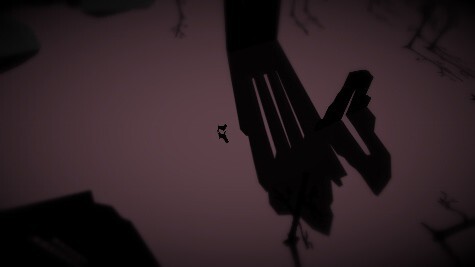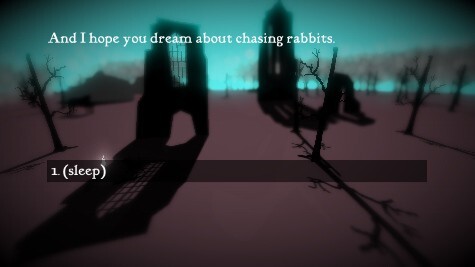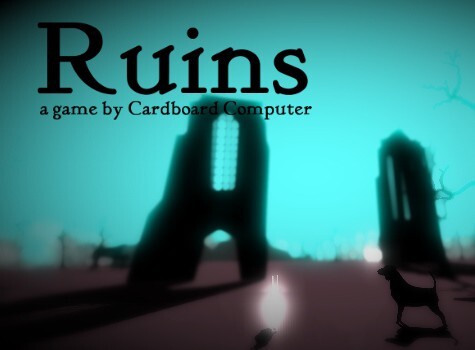Developer Summary
Ruins is a game about a dog chasing rabbits through a shadowy, dreamlike landscape.
What We think
I seem to have the perchance of running across a surprising number of enjoyable indie titles that figure animals as the protagonists for deep, unraveling narratives. One of my favorites is The Cat and the Coup, in which you play the cat of the Dr. Mossadegh, the first democratically elected Prime Minister of Iran. Ruins also wins my praise. This game has you directing a dog through an atmospheric 3D landscape of charred trees and broken walls. Its story and presentation is utterly its own. It is also illustrative enough in its language and dialogue that the game open to interpretation from beginning to end.
The sparse design allows the gamer to daydream within the space of the game. The premise is simple. As you move through the painterly landscape in the form of a dog named Aggie, you start having conversations with someone who appears to know you intimately. You only discover, over time, how you are related, and how you come to be in this melancholic space.
Because having the metaphors of the character development in the game reveal itself over time really does add to the experience, I won’t give away descriptions of what sort of characters are involved in the game. The conversation sparks from the music that robes the landscape with texture: Chopin’s Preludes are solemn without being forlorn, tender without being oppressive. The classical Romantic-era music harmonizes with the stylized visuals in a manner that I would not have predicted.

The sense of unity in the game is also dependent on how visual objects are arranged on screen. For example, our screened perspective down upon Aggie the dog is that of a god-like perspective. Whenever we use the WASD keys to move her, this ‘camera perspective’ drifts a little – parallel to the music’s rubado – and the taller ruins and trees seem closer than Aggie herself.
This gives the sense of quiet unease, as though the visual field is not altogether lucid. At the same time, it feels sublime in its sense of scale: It is as though you are being watched by a benevolent God, sonorous and present as the contemplative melodies of Chopin. Crumbled buildings and other landmarks seem like they are imperturbable sentinels, and their shadows nearly as black as their solid shape. The sky stretches on cloudlessly, not willing to give up the mystery of the time of day. All of these visual details combine together seamlessly, together with the text of the dialog that is full of enunciation and personality, with not need for voice-acting to amplify its affect.

Ruins is an enjoyable experiential title that, through its minimalism and focus, expresses the joy of having conversations. Dialog choices do no more and no less but to find out more about yourself and your companion, and how it relates to this strange landscape.
There’s an organic sense of speaking in tangents – of having memories and opinions on everyday things, on topics such as music, traveling, and how to live with one another. The thought-provoking chatter lends an additional patina to this ghostly space, and leaves the fate of all evoked characters up to your ultimate interpretation of what’s being told. And you will want to find out more, as the visual atmosphere combined with the melancholic music compel both a sense of familiarity and the need to be grounded back to reality.
With much to recommend it, Ruins is a short but satisfying experience for all who enjoy open-ended story-telling.
Download Ruins for Mac and Windows free at the Official site for Cardboard Computer
[xrr rating=”4/5″]





